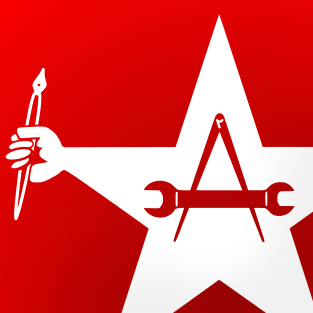UPDATE!!!
There are now free menstrual products
in some toilets at the university!
Thanks to the continued commitment after our pilot project of the Coordination Office for the Advancement of Women and Gender Equality, the TU has finally decided that there will be dispensers with free menstrual products! You can find more information here:
https://www.tu.berlin/gleichstellung/informationen/campus
And below you will find the progress of the project as a kind of archive, in case you want to start such a project at your university. You are also welcome to send us an e-mail if you have any questions
(flinta[at]asta.tu-berlin.de).
You can find the dispensers in the following toilets:
Main building
WC all gender (barrier-free): H0006A
WC women: H0100B
WC all gender: H3002A
Mathematics building
WC women: MA 04A
WC women: MA 161
Extension building
WC women (barrier-free): EB 048
WC women: EB 206A
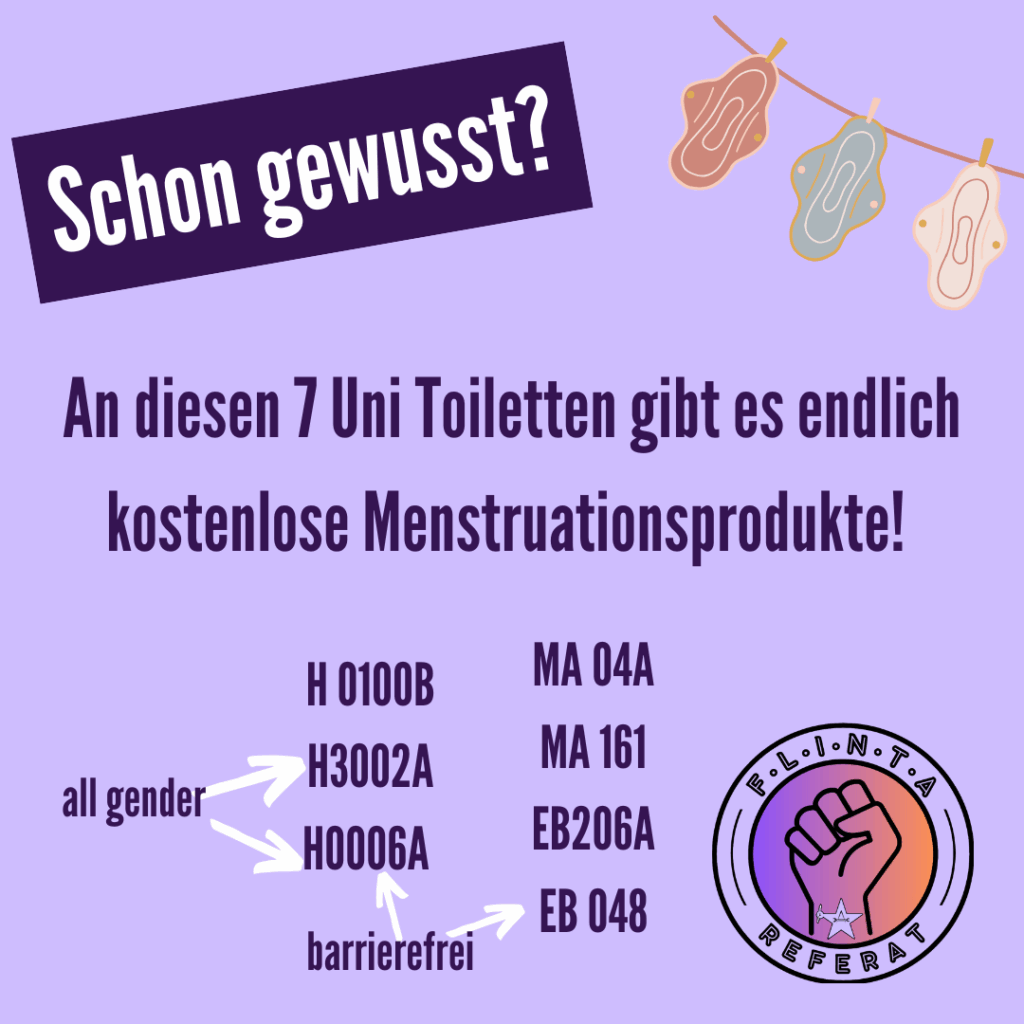
Here you can find the progress of the project, as a kind of archive 🙂
What do we want? Free menstrual products at TU!
When do we want this? Now!
Key Info
On 9.1.2023, the pilot project for free menstrual products has started at the TU Berlin. As part of this, free menstrual products will be available for TU students and staff at selected locations. We will collect feedback and see how high the consumption is in order to further expand this offer for university members and to offer it at more and more locations on campus.
The test phase we conducted lasted until the end of April and the project was handed over to the Coordinating Office for Women’s Advancement and Gender Equality (KFG) and the university management for its further development and long-term establishment.
Here you can find infrmation on the actual status of the project!
There are currently no menstrual product available.
The project has not been continued consistently by the university management.
We are working on making more pressure!
Our Events
The test phase we conducted is now over! We are no longer filling the menstrual products and the project has been handed over to KFG and the university administration for its further development.
But we are still around! We want to make more people aware of the project and the importance of having free menstrual products available. Therefore, we are now starting our information campaign on menstruation with many interesting events!
Workshop on Menstrual Products
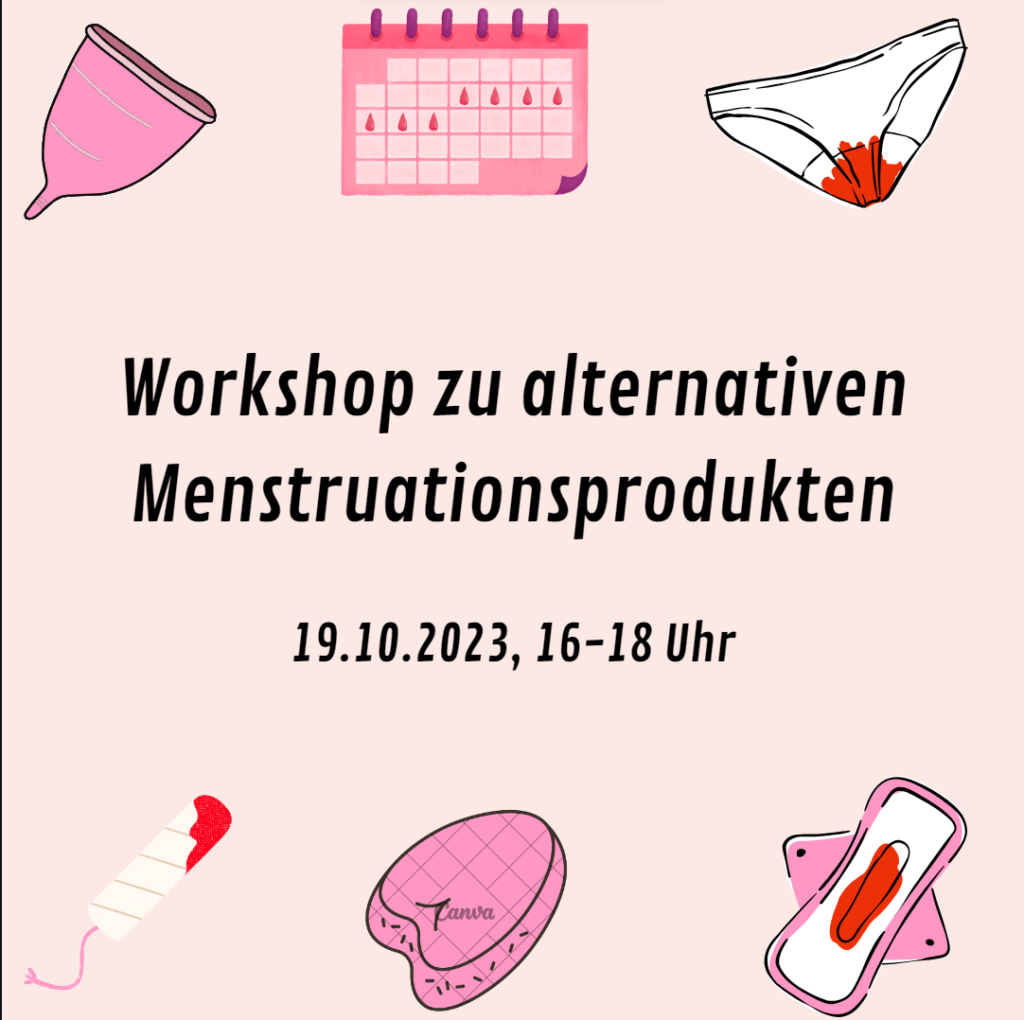
When? Friday, 17 November 2023, 4:30-6:30 p.m.
Where? Rudi-Dutschke-Plenary at AStA (1st floor, TK-building)
In this workshop we will discuss with you the different menstrual products available, their features and usage recommendations/guidelines as well as possible alternatives in terms of practicality, sustainability and personal needs.
In addition, in the second part of the workshop you will be able to make a personalised menstrual calendar and get instructions on how to sew your own sanitary pads.
The workshop is free of charge and will be held in German, but there is the possibility to switch to English.
Barrier notice:
The AStA is only accessible via steps. Please contact us at frauenreferat@asta.tu-berlin.de if this prevents you from participating or if there are other barriers. We will try to find alternatives and ensure the best possible participation for all students.
Workshop zu Zykluswissen und -verständnis mit Lena Röpert von der Zyklus Akademie
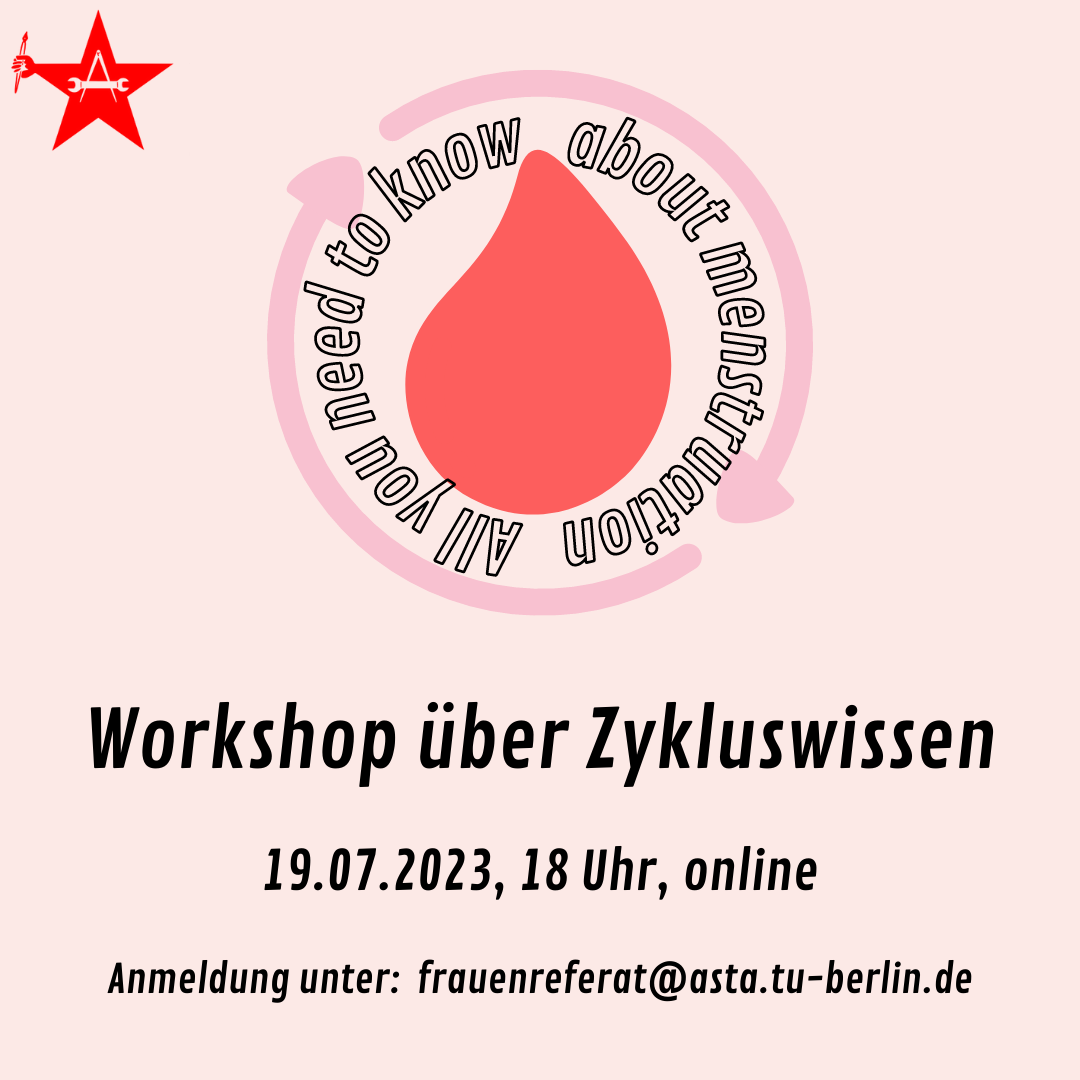
Wann? 19.07.2023, 18-19.30 Uhr
Wo? online über Zoom. Der Link bekommt ihr nach der Anmeldung.
Für wen? Der Workshop ist für alle offen.
In diesem Workshop kannst du die Grundlagen über den Menstruationszyklus erlernen und deine Fragen stellen.
In dem Workshop lernst du:
🩸 wie der Zyklus aufgebaut ist
🩸 die verschiedenen Zyklusphasen und die darin innewohnenden Stärken und Qualitäten kennen
🩸 was die Hormone damit zu tun haben
🩸erste Schritte für gängige Menstruationsbeschwerden und PMS (Prämenstruelles Syndrom)
🩸wie du deinen Alltag zyklusgerecht gestalten und deine Energie optimal nutzen kannst.
Der Workshop ist kostenlos und findet in deutscher Lautsprache statt.
Workshop über Periodenarmut mit Social Period e.V.
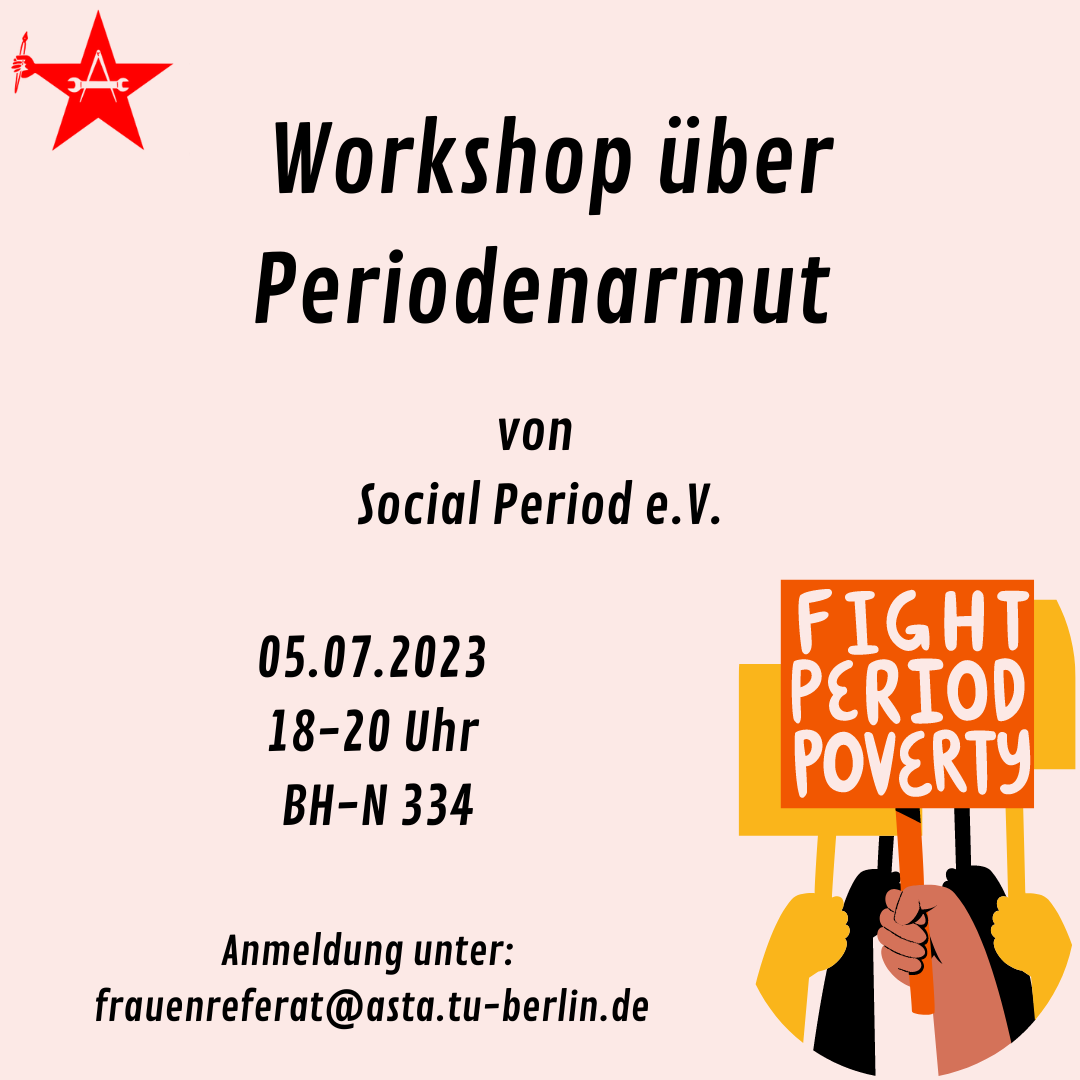
Wann? am 5.7.2023, 18-20 Uhr
Wo? Raum B-HN 334
Für wen? Der Workshop ist für alle offen.
Was ist Periodenarmut? Wer ist davon betroffen? Wie kann sie bekämpft werden?
Periodenarmut (oder “period poverty”) ist der Überbegriff für Ungleichheiten im Zusammenhang mit Menstruation. Insbesondere einkommensschwache und obdachlose Menschen, sowie diejenigen mit Flucht- und/oder Traumaerfahrung haben mit den Folgen von Periodenarmut zu kämpfen.
In diesem Workshop von Social Period e.V. erfährst du mehr über Periodenarmut, ihre Folgen und wie mensch sich an ihrer Bekämpfung beteiligen kann.
Social Period e.V. ist deutschlandweit aktiv und möchte obdach- und wohnungslosen Menschen den Zugang zu Menstruationsprodukten vereinfachen. https://www.socialperiod.org/
Der Workshop ist kostenlos und findet in deutscher Lautsprache statt.
Coming up:
Workshop on cycle-based sports training
Locations
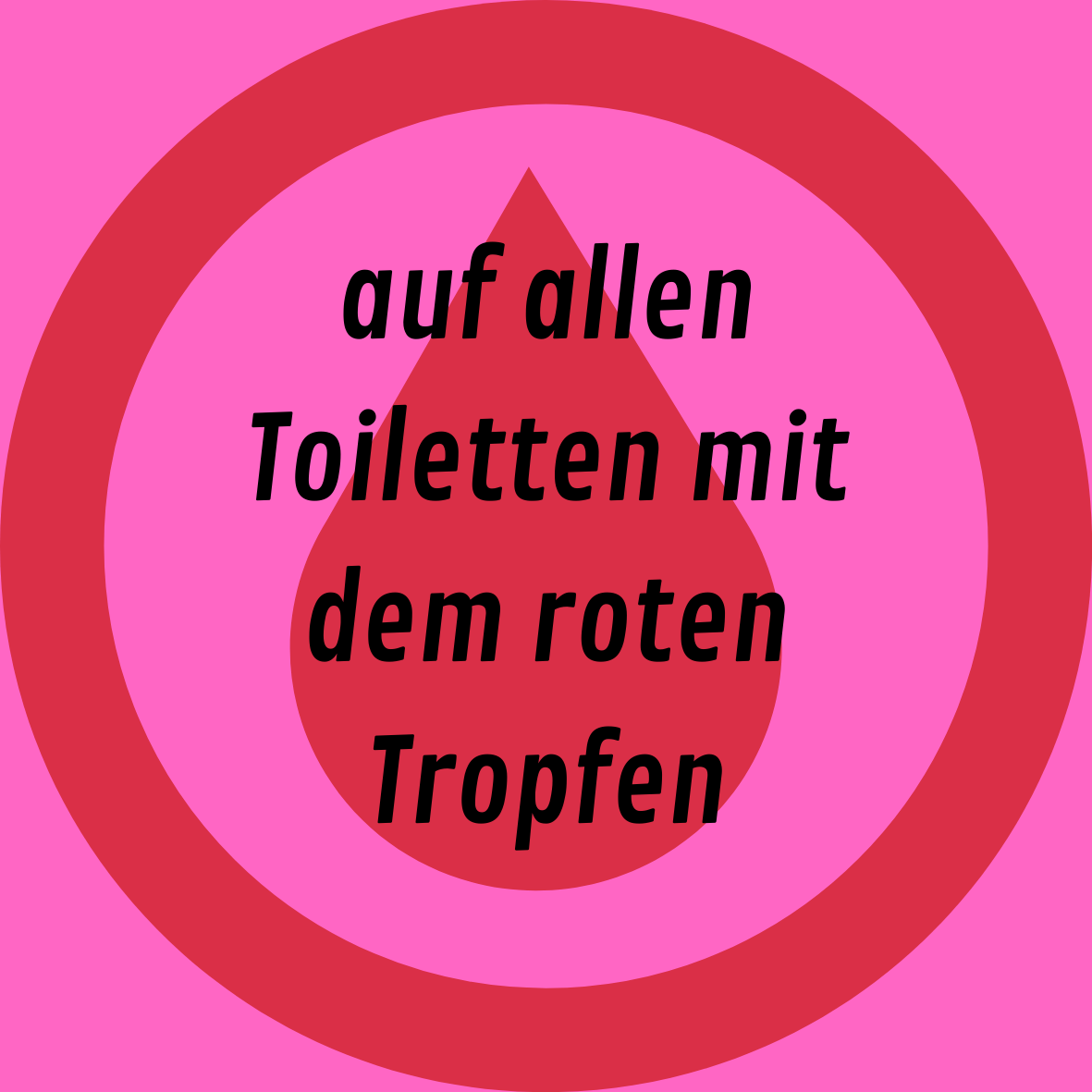
Main building
- Toilet next to H 0100A (women’s toilet) (barrier-free)
ground floor, very close to auditorium H 0104 and H 0105 (Audimax) - Gender-neutral toilet H 3002A
3rd floor - Coordinating Office for Women’s Advancement and Gender Equality H 1108
1st floor, area 1K - Family Services Office H 1111
1st floor, area 1K
Maths building
- MA 004A (women’s toilet)
ground floor behind the main entrance on the right - MA 161 (women’s and men’s toilets) barrier-free
accessible via the lift on the 1st floor
EB building
- Toilets (women’s and men’s) barrier-free
ground floor at the exit towards Straße des 17. Juni - Toilets EB 206 (women’s and men’s toilets)
2nd floor
AStA (TK-building)
- Gender-neutral toilet barrier-free
ground floor behind the entrance on the left (in front of TK 016A)
The toilets where menstrual products are available are marked with a sticker of a red drop on the door (also on some individual cubicles).
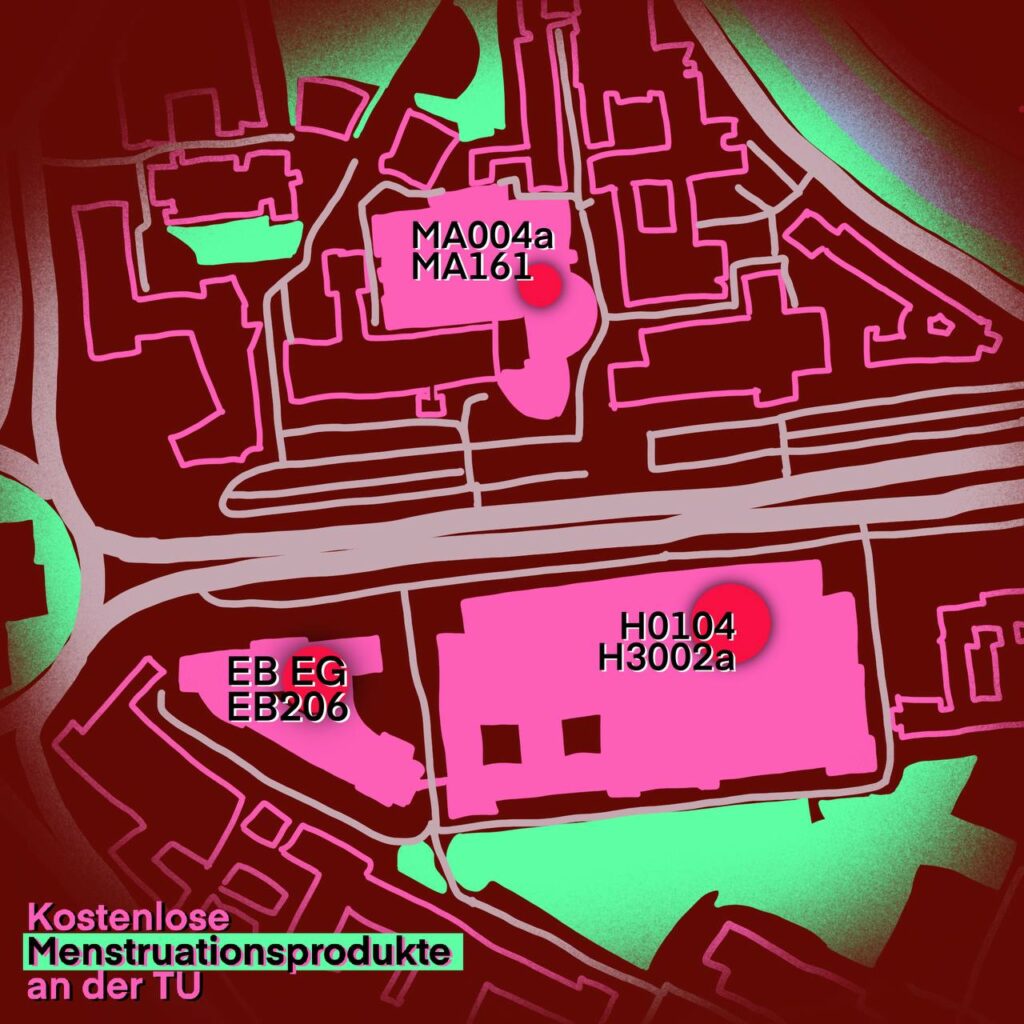
Due to vandalism, several boxes that were placed in the men’s toilets are no longer available. We are working to find a solution so that menstrual products are accessible to all.
It has also been requested that the toilet cubicles are equipped with enough waste bins.
Why?
The use of menstrual products is as all-important to menstruating people as the use of toilet paper and soap. Yet access to these essential menstrual products can present students with financial challenges and limit their participation in teaching and university life.
For many people, menstruation can be very unexpected and it should be possible for all students to participate fully in teaching and university life – for example, without having to leave lectures to hurry to the nearest supermarket or home.
Menstrual products are also a monthly expense that not all students can afford: those affected by so-called period poverty then have to resort to unhygienic alternatives or stay away from university altogether.
Therefore, with this project we want to take an important first step on the path that other German universities (e.g. Charité, University of Potsdam) have already attempted.
Product information
The tampons and pads are from MYLILY, a start-up from Hamburg. https://mylily.eu/
Normal tampons
- Vegan & 100% certified GOTS organic cotton
- Antiallergenic
- No synthetic fibres, chemicals like chlorine bleach or pesticides, fragrances & dyes, microplastics.
- Biodegradable & compostable
Normal pads
- 100% organic cotton
- Free from chlorine, fragrances & harmful substances
- Antiallergenic & breathable
- Absorbent with wings
For further questions and feedback
Contact us via e-mail: flinta@asta.tu-berlin.de
How can you help us
During the test phase of the project, it was especially important to collect as much feedback as possible. Thank you to everyone who took part in our survey!
If you can imagine to be actively involved please contact flinta@asta.tu-berlin.de . We are looking forward to it !
For the valuable cooperation and support, many thanks to
EB104, IniChemie, Coordinating Office for Women’s Advancement and Gender Equality, Queer Department of AStA, Family Services Office
